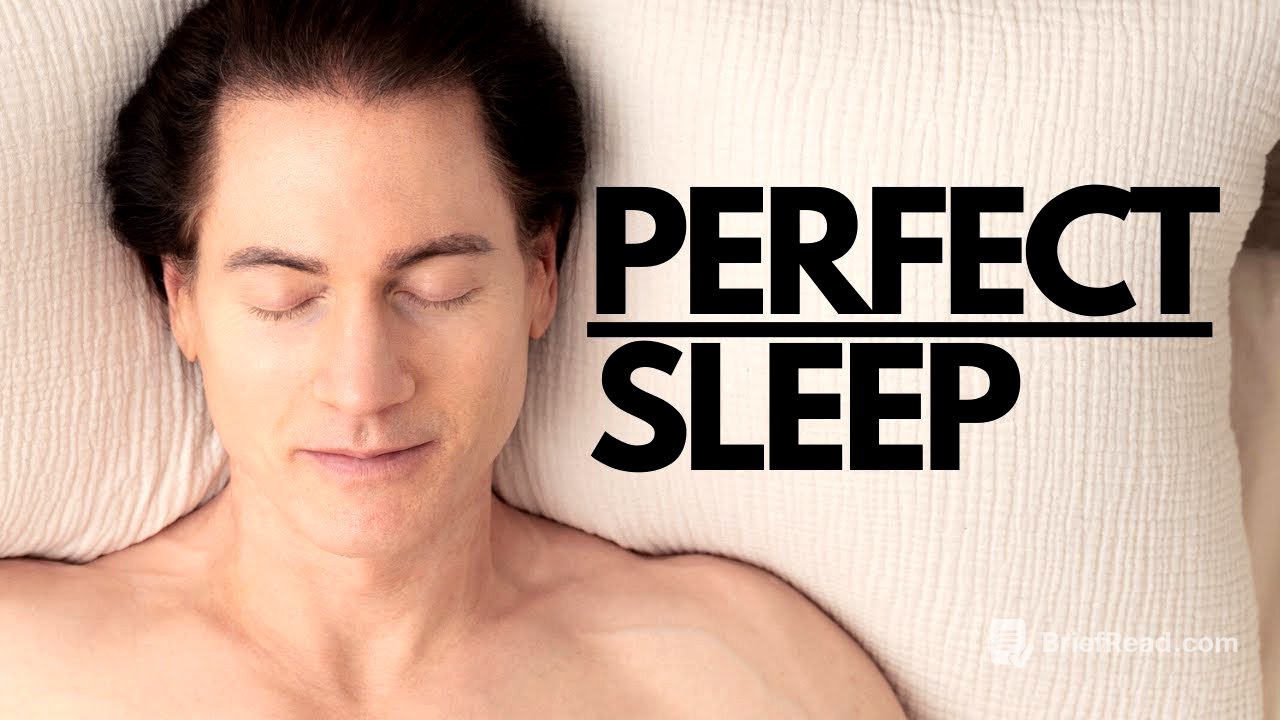TLDR;
Bryan Johnson shares 10 actionable steps to improve sleep quality, based on his experience achieving "perfect sleep" for eight months. He emphasizes the importance of consistent routines, avoiding stimulants, regulating light exposure, and creating a peaceful sleep environment. He also highlights the value of tracking sleep data to understand individual needs and optimize sleep patterns.
- Prioritize sleep as a professional sleeper.
- Maintain a consistent bedtime.
- Establish a relaxing wind-down routine.
- Eat meals earlier in the day.
- Avoid stimulants like alcohol and caffeine.
- Regulate evening light exposure.
- Control room temperature for optimal sleep.
- Create a peaceful sleep environment.
- Expose yourself to morning light.
- Gather data to track and improve sleep.
8 months of perfect sleep [0:00]
Bryan Johnson introduces the video by stating that he will share 10 life-changing tips to achieve perfect sleep, based on his personal experience of logging eight months of optimal sleep. He emphasizes that these tips are accessible and free, aiming to help viewers prioritize sleep for overall well-being. He encourages viewers to track their progress and aim to become "professional sleepers."
1. Identify as a professional sleeper [1:04]
Bryan Johnson stresses the importance of prioritizing sleep and viewing it as a crucial aspect of life, contrary to the "grind culture" that often glorifies sleep deprivation. He suggests that making sleep a top priority leads to improved physical appearance, enhanced mood, and overall ease in life.
2. Consistent bedtime [1:29]
Maintaining a consistent bedtime is crucial for regulating the body's natural sleep-wake cycle. Bryan Johnson advises scheduling bedtime as a non-negotiable appointment and adjusting daily routines, such as dinner time, to accommodate it. He shares his personal bedtime of 8:30 PM, emphasizing the importance of respecting this commitment to oneself.
3. Wind down routine [2:34]
Bryan Johnson highlights the importance of a relaxing wind-down routine to prepare the mind for sleep. He introduces the concept of "sleep Brian," a mental state engaged 30-60 minutes before bed to dismiss intrusive thoughts. He recommends activities like reading, walking, or hobbies, while avoiding screens and stressful situations.
4. Eat early [3:14]
Based on personal experimentation, Bryan Johnson suggests eating meals earlier in the day to improve sleep quality. He shares his experience of having his last meal at 11:00 a.m. and encourages viewers to experiment with earlier eating times and avoid heavy meals late in the day. He also provides tips for navigating social events while maintaining his eating schedule.
5. Avoid stimulants [4:07]
Bryan Johnson advises avoiding stimulants like alcohol and caffeine, as they can disrupt sleep patterns. He shares his personal experience of how alcohol significantly reduces his deep sleep and mentions that he has eliminated caffeine from his diet to improve sleep quality.
6. Regulate evening light [4:45]
Regulating light exposure in the evening is important for promoting sleep. Bryan Johnson uses the Flux app to eliminate blue light from his computer screen, wears blue light blocking glasses, and ensures his room is completely dark. He emphasizes the importance of minimizing screen time before bed.
7. Temperature control [5:26]
Maintaining an ideal temperature is important for quality sleep. Bryan Johnson uses an Eight Sleep mattress to regulate temperature during different sleep stages. He suggests experimenting with thermostat settings, bedding, and airflow to find the optimal temperature for sleep.
8. Peaceful environment [6:10]
Creating a peaceful sleep environment is crucial for both adults and children. Bryan Johnson emphasizes the importance of establishing sleep rules for the family and addressing external factors like noise. He also recommends using the bedroom solely for sleep to condition the body for rest. He also suggests considering sleeping alone if possible to avoid sleep disturbances.
9. Morning light [5:56]
Bryan Johnson highlights the importance of morning light exposure for regulating the body's natural rhythms. He uses a 10,000 Lux light for a few minutes upon waking to signal the start of the day. He also suggests getting sunlight exposure in the morning or evening, while avoiding peak UV index hours.
10. Gather data [8:52]
Bryan Johnson emphasizes the value of tracking sleep data to gain insights into individual sleep patterns and identify factors that improve or worsen sleep. He uses a Whoop band to track sleep duration, quality, and exertion levels. He compares this data tracking to using a stopwatch when training for a race, highlighting its importance in measuring progress and making informed adjustments.









